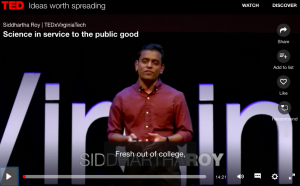“Character” in Character Education by Stephanie Rothman
This Blog is written in response to Siddhartha Roy’s “Science in Service of the Public Good” TedxVirginiaTech Talks, in which he argues that if we help our school-going children build character, skills and virtues, the water crisis in Flynt, MI could have been averted. He states that the Education system in the United States is focused on creating “Excellent Sheep”, a term coined by William Deresiwicz who describes students as somehow risk-averse, timid, directionless and narcissistic. We are creating students who will spend time polishing their resumes as opposed to reflecting on what they want to do and who they want to be. According to Siddhartha, we must teach kids as if they were “heroes-in-training.” We need to teach them to aspire to do or to be anyone they desire, as long they do it for the good of the public.
Recently, character education has made a “come-back”, especially during the late 1990s since the United States has been plagued with routine school shootings, ubiquitous bullying, and other violent behaviors in schools. Researchers have recognized the multidimensional aspects of character beyond just moral and civic, to include intellectual character and performance character as well (Davidson, 2004).
It is important to recognize a “four-dimensional” conceptual model of personal character so that we may help our students to foster strengths and virtues pertaining to each dimension. Some virtues may not be practiced with moral and civic means in mind. For instance, while a medical student may display intellectual virtues such as attentiveness, curiosity, and open-mindedness, and performance virtues such as self-discipline and patience, he or she might still lack moral virtues by displaying academic dishonesty, arrogance, and envy.
It is equally important to distinguish performance with moral and civic virtues in order to help students foster virtues appropriately. Performance virtues are useful in executing challenging and complex tasks, but not necessarily for the means of the public good. For instance, a criminal mind might display performance virtues such as grit, patience, resilience, and perseverance, while also being cruel, merciless, and indifferent to any civic responsibility. However, “moral and civic goods are such that can be achieved only by the way of practice of performance virtues. For instance, maintain a good relationship with one’s friends and loved ones can require considerable patience, self-control, and perseverance” (Baehr, 2017).
In short, a person may display intellectual virtues such as curiosity, attentiveness, open-mindedness, and intellectual thoroughness while possessing intellectual vices such as arrogance, dishonesty and laziness. Nonetheless, intellectual and civic virtues may intersect given that civically virtuous behaviors often involve virtuous intellectual activity like a careful, thorough, and honest assessment of diverse political positions and arguments (Hazlett, 2016).
When teaching our students about character education, educators need to focus on the INTENTIONS part of character education. The recognition the four dimensions of character and how it is related to character education in elementary and secondary schools can help guide the creation of a curriculum that include activities and learning opportunities emphasizing each dimension. “Character education isn’t just about helping students become kind, honest, and fair. It’s also teaching them to work hard, develop their talents, and strive for excellence so that they are equipped to make a positive difference in the world” (Davidson, 2014).
One of my favorite characters in history, Theodore Roosevelt, states it perfectly: “To educate a man in mind and not in morals is to educate a menace society.” The tragedy of Marjory Stoneman Douglas in Parkland, Florida on Valentine’s Day, 2014, could have been perhaps prevented if our schools had character education at the forefront of their curricula.
References:
Baehr, J. (2017). The varieties of character and some implications for character education. Journal of Youth and Adolescence, 46(6), 1153-1161.
Davidson, M. (2014). A CHARACTER EDUCATION RESEARCH PERSPECTIVE FOR THE 21st CENTURY. Journal of Character Education, 10(1), 77-83.
